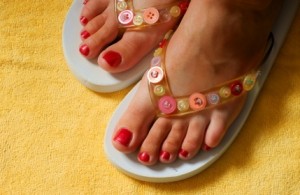 A few decades ago, manicures and pedicures were something your grandmother and her friends did. Today, it has become popular with all ages--probably due to the general acceptance that women could pack away their panty hose and go bare-legged and the popularity of flip flops. As the consumer base widened, so did the number of nail salons, from store front services that featured express nail polish repair to high-end spas that offered a wide range of nail services that included organic and luxury cream treatments. According to Jobbank.usa, there are over 78,000 manicurists in this country.
A few decades ago, manicures and pedicures were something your grandmother and her friends did. Today, it has become popular with all ages--probably due to the general acceptance that women could pack away their panty hose and go bare-legged and the popularity of flip flops. As the consumer base widened, so did the number of nail salons, from store front services that featured express nail polish repair to high-end spas that offered a wide range of nail services that included organic and luxury cream treatments. According to Jobbank.usa, there are over 78,000 manicurists in this country.
So who regulates these services and are they safe? Nail salons and technicians are license or certified at the state level often under the category of Cosmetology. Each state has its own licensing/regulatory agency and rules. These agencies regulate services ranging from acupuncturists to barbers to veterinary technicians. Generally, the regulations are set by state law and include very specific guidelines that address safety and cleanliness. The agency is responsible for oversight. However, a call to one such agency confirmed my suspicion that in these trying fiscal times, there is little staff to visit the thousands of establishments under their jurisdiction.
level often under the category of Cosmetology. Each state has its own licensing/regulatory agency and rules. These agencies regulate services ranging from acupuncturists to barbers to veterinary technicians. Generally, the regulations are set by state law and include very specific guidelines that address safety and cleanliness. The agency is responsible for oversight. However, a call to one such agency confirmed my suspicion that in these trying fiscal times, there is little staff to visit the thousands of establishments under their jurisdiction.
So what is a girl/woman to do?
First of all, what are the risks? Podiatrists report that skin and nail infections are seen in people who frequent nail salons and pedicures seem to be of special concern. Even if the risk is low, it takes only one infection to create a health problem. If a salon is vigilant and follows industry and government standards, they can be perfectly safe. If not, the list of possible problems is pretty gross so they are not listed here.
It is really up to the customer to decide if she feels a particular salon is keeping up its standards. Here is a list of questions you can ask before booking:
- Does the salon have a license to operate from the state? (it should be posted somewhere)
- Is your technician either certified or licensed by the state? If your technician is from another country or another state, she is still required to be licensed where she practices.
- How does the salon clean its tools? (it takes more than 10 minutes for tools to be sterilized in a sterilizer or 25 minutes if UV light is used; a quick spritz of alcohol is not enough)
- How is the pedicure bath cleaned between clients? (unscrubbed tubs are a breeding ground for fungal and bacterial infections including staph; also jet tubs can be particularly unsafe if the filter is not changed frequently)
Are there some things you can do to protect yourself if you do have frequent pedis and manis?
- Bring your own tools (some salons will store them for you)
- Avoid cutting cuticles and using a razor to shave calluses.
- Do not shave your legs before your appointment.
- Do not be shy if you see something you feel is unsafe--point it out to the owner.
If you are truly adventurous and want to try a fish pedicure or fish therapy, a recent fad where you put your feet in a tub filled with tiny fish that eat away dead skin, please beware. Sanitizing fish in accordance with most sanitation standards, would most certainly kill the fish! Several states have posted alerts indicating this treatment is not safe.

Comments
Pages